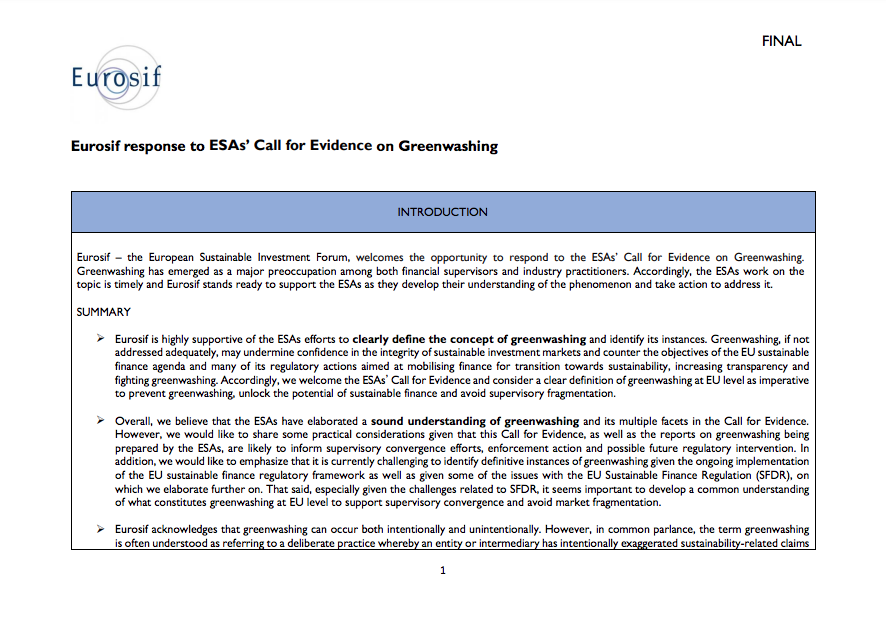Communication
On 16th January, Eurosif responded to the ESAs’ Call for Evidence on Greenwashing.
16 January 2023
Eurosif is highly supportive of the ESAs efforts to clearly define the concept of greenwashing and identify its instances. Greenwashing, if not addressed adequately, may undermine confidence in the integrity of sustainable investment markets and counter the objectives of the EU sustainable finance agenda and many of its regulatory actions aimed at mobilising finance for transition towards sustainability, increasing transparency and fighting greenwashing.
Overall, we believe that the ESAs have elaborated a sound understanding of greenwashing and its multiple facets in the Call for Evidence. In our response, we share some practical considerations and suggestions to further improve the ESAs’s proposals:
- Eurosif would advise the use of a different term to refer to unintentionally misleading and erroneous sustainability-related claims. Given the potential for unintentional greenwashing to occur during the implementation and initial application of the sustainable finance regulatory framework, being able to differentiate between deliberate greenwashing and unintentionally misleading or erroneous sustainability-related claims will be essential to allowing sustainable investment practitioners the space and time needed to adapt to the framework.
- We agree that financial institutions will often be the ‘spreader’ of greenwashing and thus may be involved, unintentionally, in a large share of greenwashing cases given their dependence on the sustainability-related information obtained from the investee companies or ESG data providers. At present, sufficiently granular, comparable and reliable data on the ESG performance of investee companies is still difficult to obtain. The recently adopted Corporate Sustainability Reporting Directive (CSRD) is expected to rectify this issue. However, it will take several years before the new European Sustainability Reporting Standards (ESRS) are finalised and the new rules area applied by all companies within the scope of this directive.
- FMPs can also act as triggers of greenwashing by making exaggerated or misleading claims with respect to their firm-wide policies and practices, the qualifications and expertise of their board or staff on sustainability-related matters, and in relation to the sustainable investment strategies and composition of the investments products that they manufacture and distribute. Such cases, if identified and reliably proven, should be adequately penalised.
- Claims pertaining to the process applied by FMPs and claims related to the outcomes/exposures envisaged by a product, policy or practice may or may not achieve should be differentiated.
- Finally, certain aspects of the sustainable finance regulatory framework heighten the risk of greenwashing at a systemic level. The SFDR has caused a paradigm shift in the market through the introduction of comprehensive disclosure requirements. However, there are aspects of the framework that need refining, as previously addressed by Eurosif in its report on making SFDR fit for purpose. We are therefore very supportive of the intention of the European Commission to start a review process of the SFDR this year.

